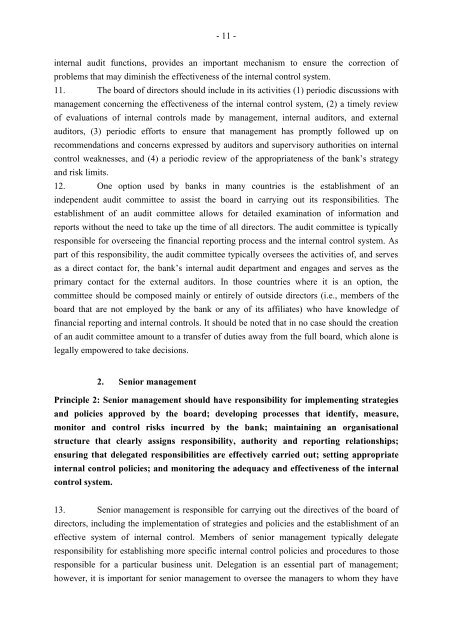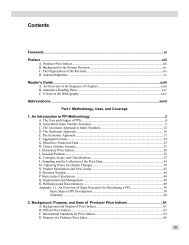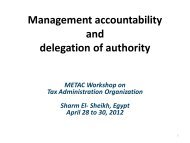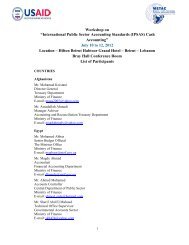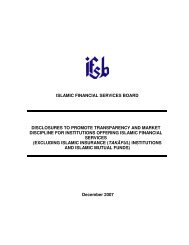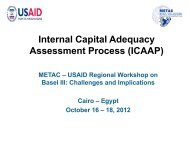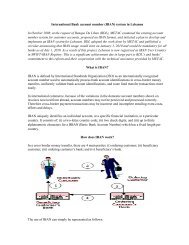Framework for Internal Control Systems in Banking Organisations
Framework for Internal Control Systems in Banking Organisations
Framework for Internal Control Systems in Banking Organisations
Create successful ePaper yourself
Turn your PDF publications into a flip-book with our unique Google optimized e-Paper software.
- 11 -<br />
<strong>in</strong>ternal audit functions, provides an important mechanism to ensure the correction of<br />
problems that may dim<strong>in</strong>ish the effectiveness of the <strong>in</strong>ternal control system.<br />
11. The board of directors should <strong>in</strong>clude <strong>in</strong> its activities (1) periodic discussions with<br />
management concern<strong>in</strong>g the effectiveness of the <strong>in</strong>ternal control system, (2) a timely review<br />
of evaluations of <strong>in</strong>ternal controls made by management, <strong>in</strong>ternal auditors, and external<br />
auditors, (3) periodic ef<strong>for</strong>ts to ensure that management has promptly followed up on<br />
recommendations and concerns expressed by auditors and supervisory authorities on <strong>in</strong>ternal<br />
control weaknesses, and (4) a periodic review of the appropriateness of the bank’s strategy<br />
and risk limits.<br />
12. One option used by banks <strong>in</strong> many countries is the establishment of an<br />
<strong>in</strong>dependent audit committee to assist the board <strong>in</strong> carry<strong>in</strong>g out its responsibilities. The<br />
establishment of an audit committee allows <strong>for</strong> detailed exam<strong>in</strong>ation of <strong>in</strong><strong>for</strong>mation and<br />
reports without the need to take up the time of all directors. The audit committee is typically<br />
responsible <strong>for</strong> oversee<strong>in</strong>g the f<strong>in</strong>ancial report<strong>in</strong>g process and the <strong>in</strong>ternal control system. As<br />
part of this responsibility, the audit committee typically oversees the activities of, and serves<br />
as a direct contact <strong>for</strong>, the bank’s <strong>in</strong>ternal audit department and engages and serves as the<br />
primary contact <strong>for</strong> the external auditors. In those countries where it is an option, the<br />
committee should be composed ma<strong>in</strong>ly or entirely of outside directors (i.e., members of the<br />
board that are not employed by the bank or any of its affiliates) who have knowledge of<br />
f<strong>in</strong>ancial report<strong>in</strong>g and <strong>in</strong>ternal controls. It should be noted that <strong>in</strong> no case should the creation<br />
of an audit committee amount to a transfer of duties away from the full board, which alone is<br />
legally empowered to take decisions.<br />
2. Senior management<br />
Pr<strong>in</strong>ciple 2: Senior management should have responsibility <strong>for</strong> implement<strong>in</strong>g strategies<br />
and policies approved by the board; develop<strong>in</strong>g processes that identify, measure,<br />
monitor and control risks <strong>in</strong>curred by the bank; ma<strong>in</strong>ta<strong>in</strong><strong>in</strong>g an organisational<br />
structure that clearly assigns responsibility, authority and report<strong>in</strong>g relationships;<br />
ensur<strong>in</strong>g that delegated responsibilities are effectively carried out; sett<strong>in</strong>g appropriate<br />
<strong>in</strong>ternal control policies; and monitor<strong>in</strong>g the adequacy and effectiveness of the <strong>in</strong>ternal<br />
control system.<br />
13. Senior management is responsible <strong>for</strong> carry<strong>in</strong>g out the directives of the board of<br />
directors, <strong>in</strong>clud<strong>in</strong>g the implementation of strategies and policies and the establishment of an<br />
effective system of <strong>in</strong>ternal control. Members of senior management typically delegate<br />
responsibility <strong>for</strong> establish<strong>in</strong>g more specific <strong>in</strong>ternal control policies and procedures to those<br />
responsible <strong>for</strong> a particular bus<strong>in</strong>ess unit. Delegation is an essential part of management;<br />
however, it is important <strong>for</strong> senior management to oversee the managers to whom they have


